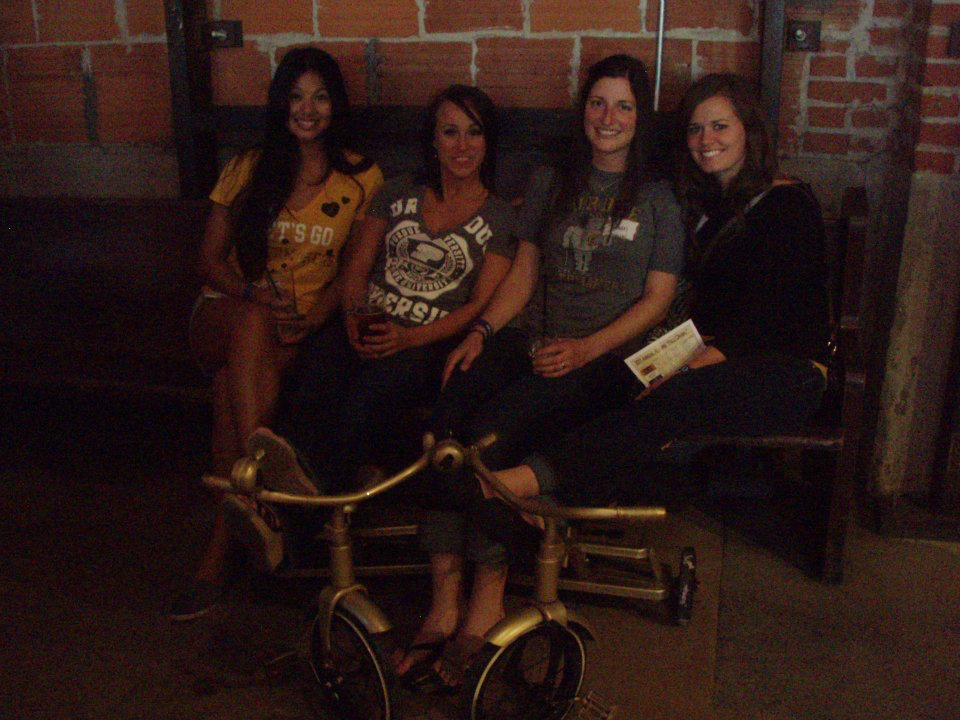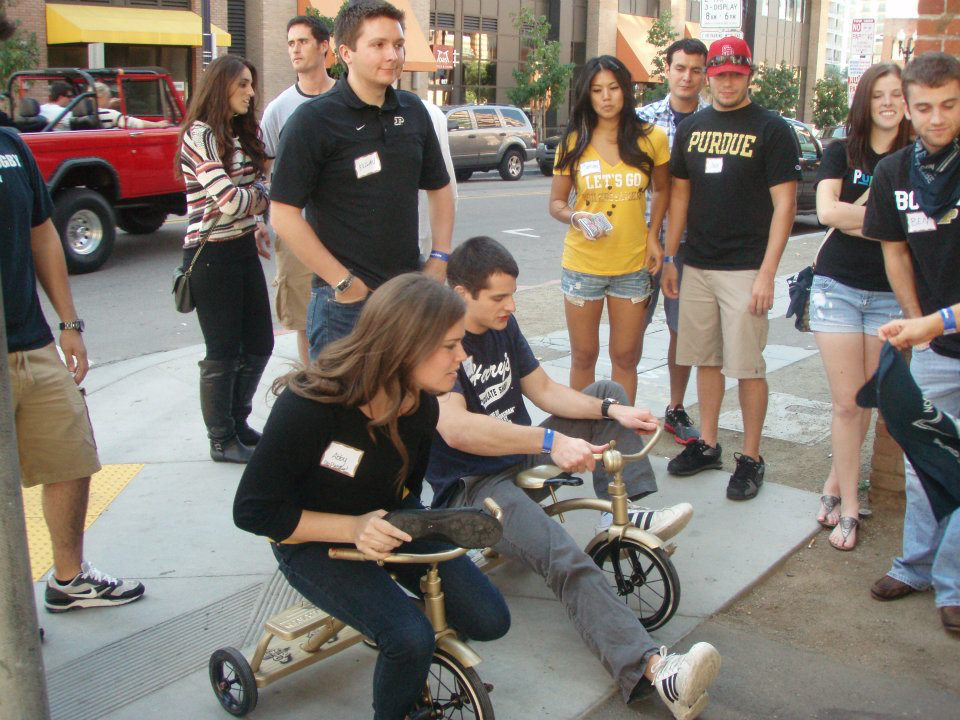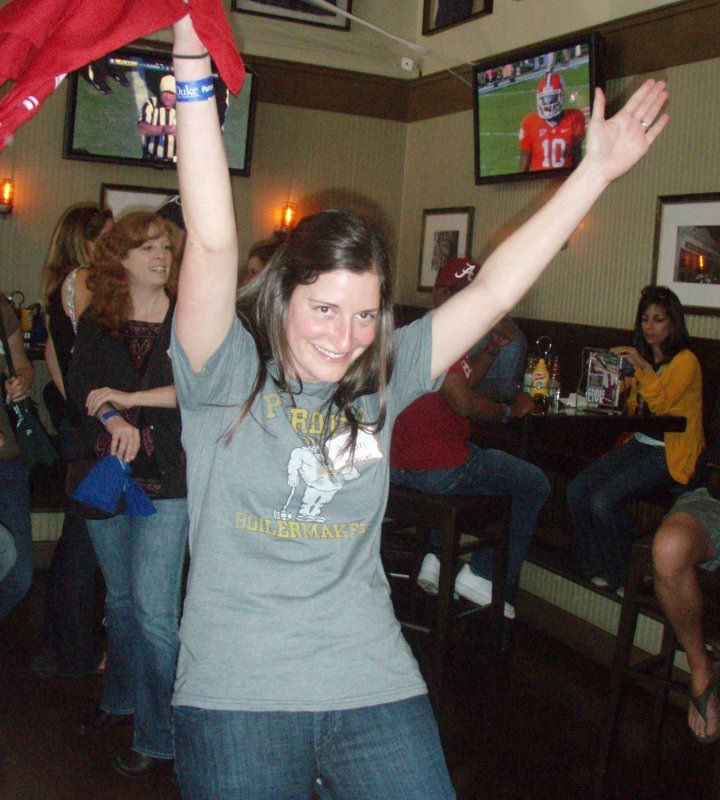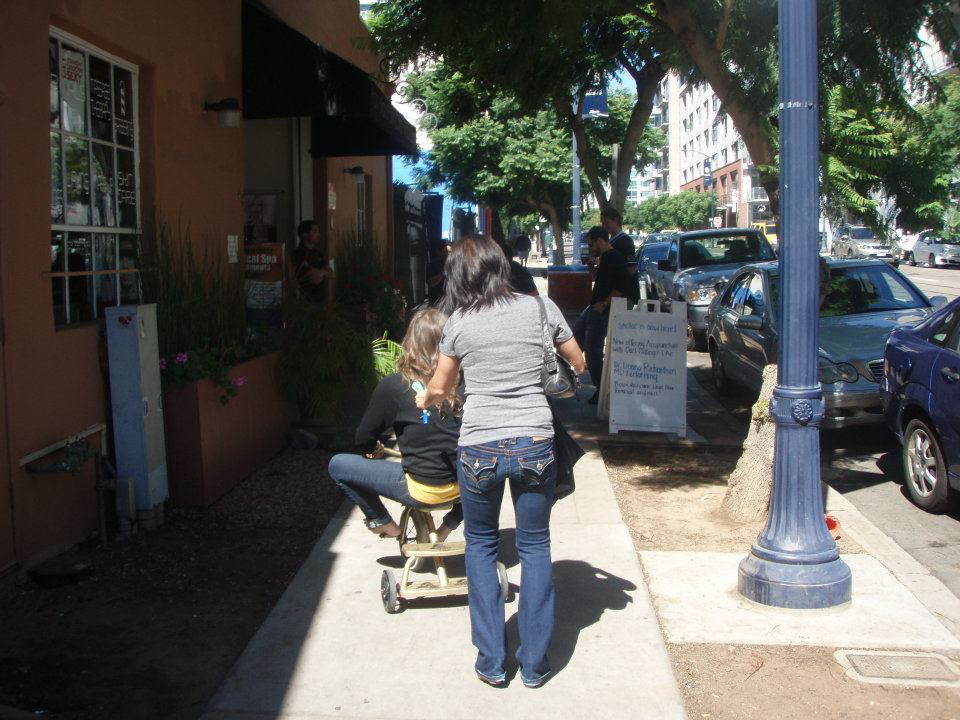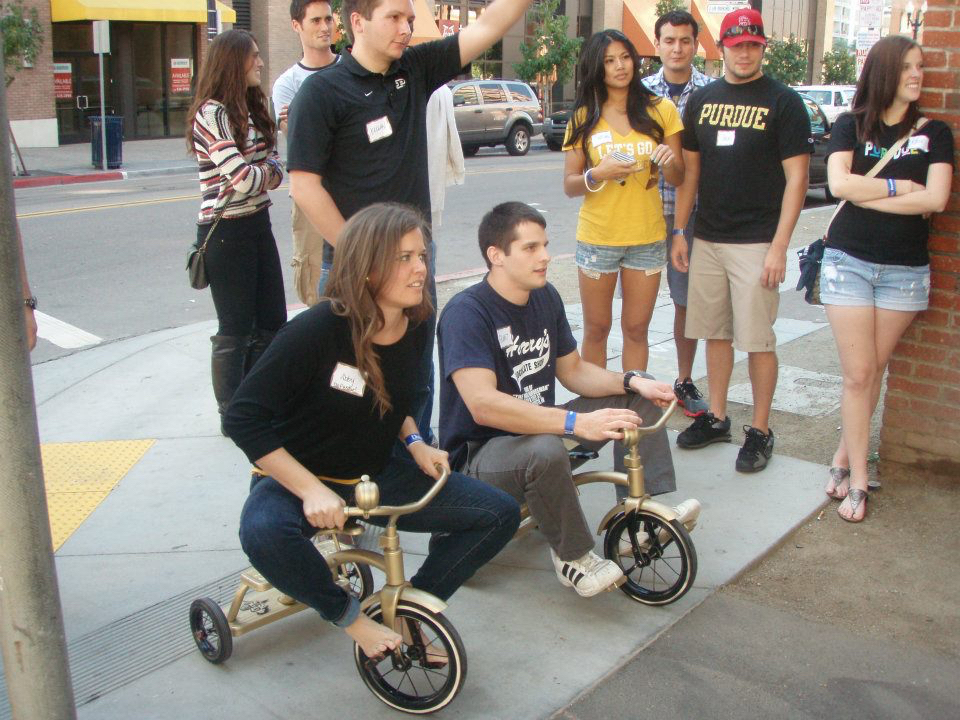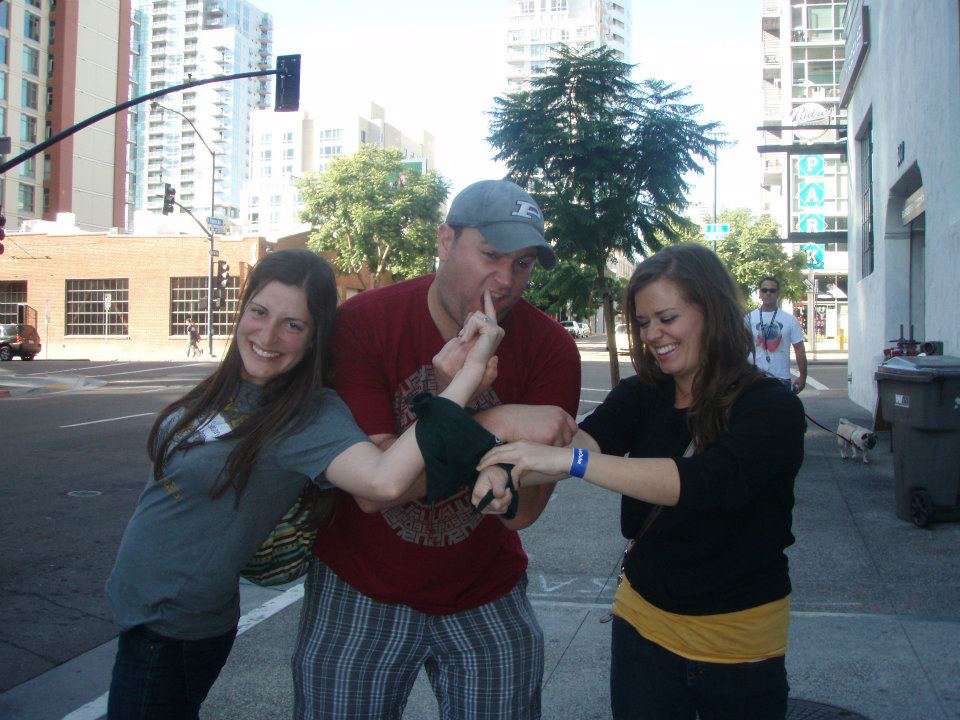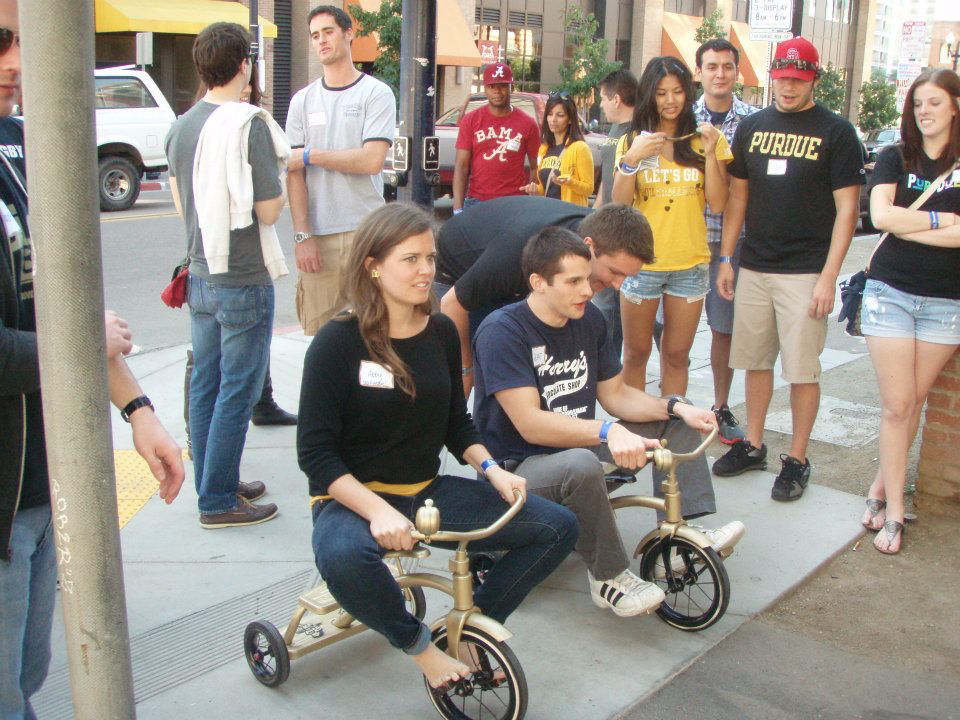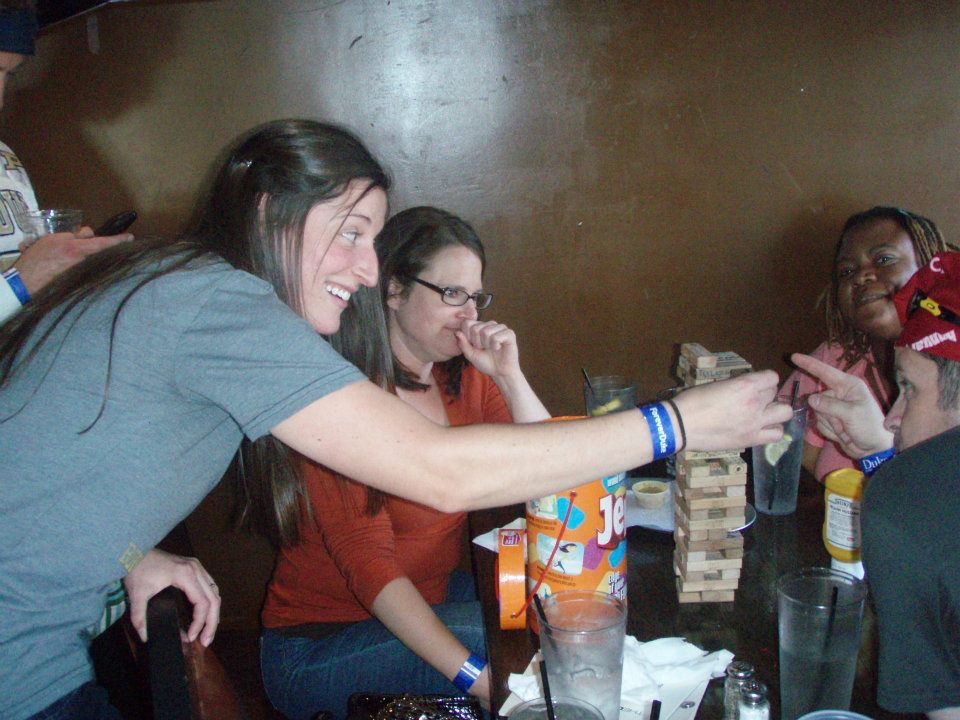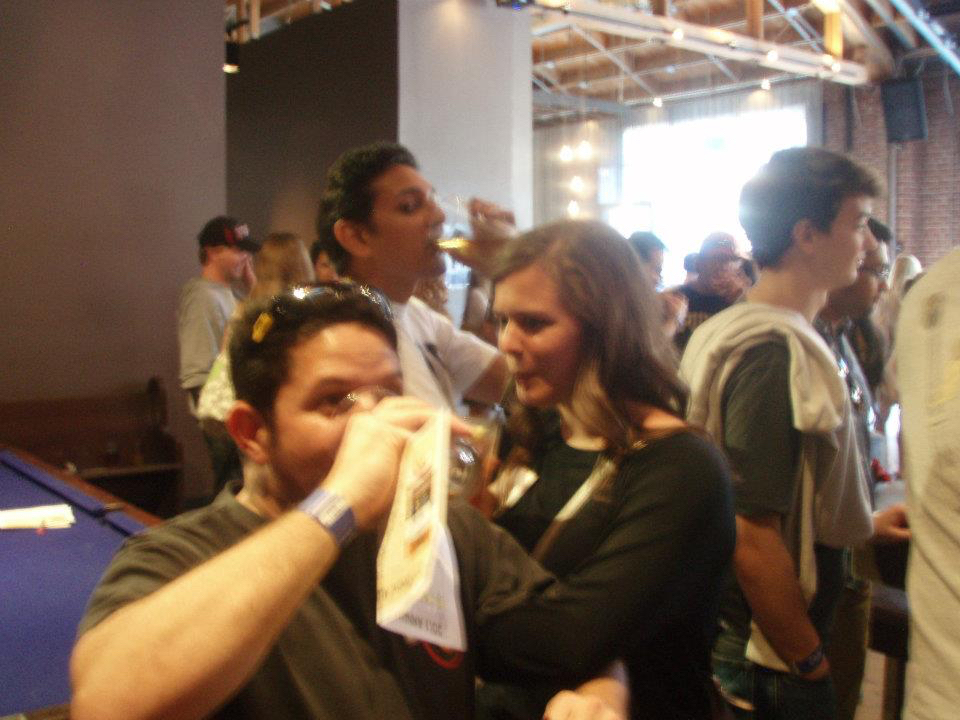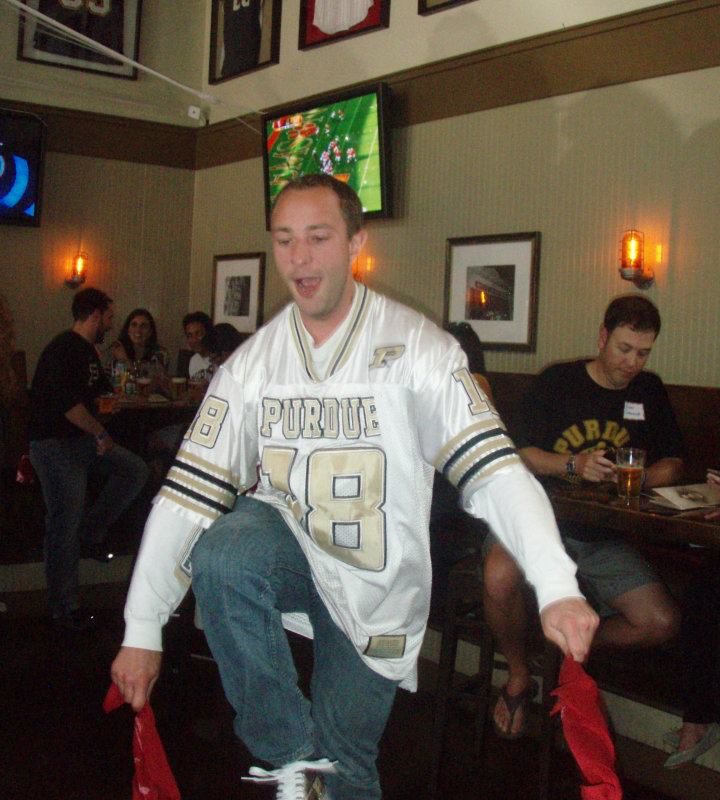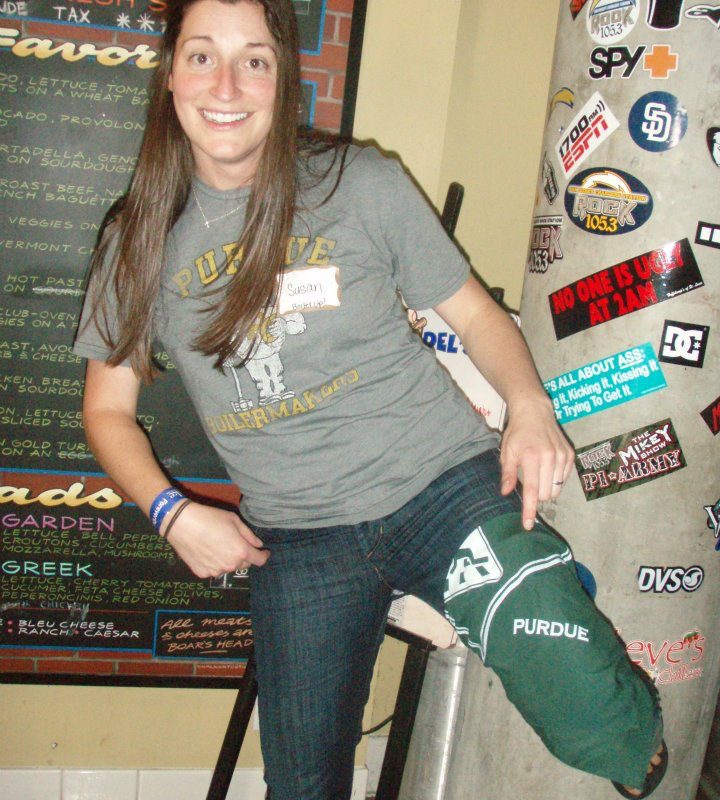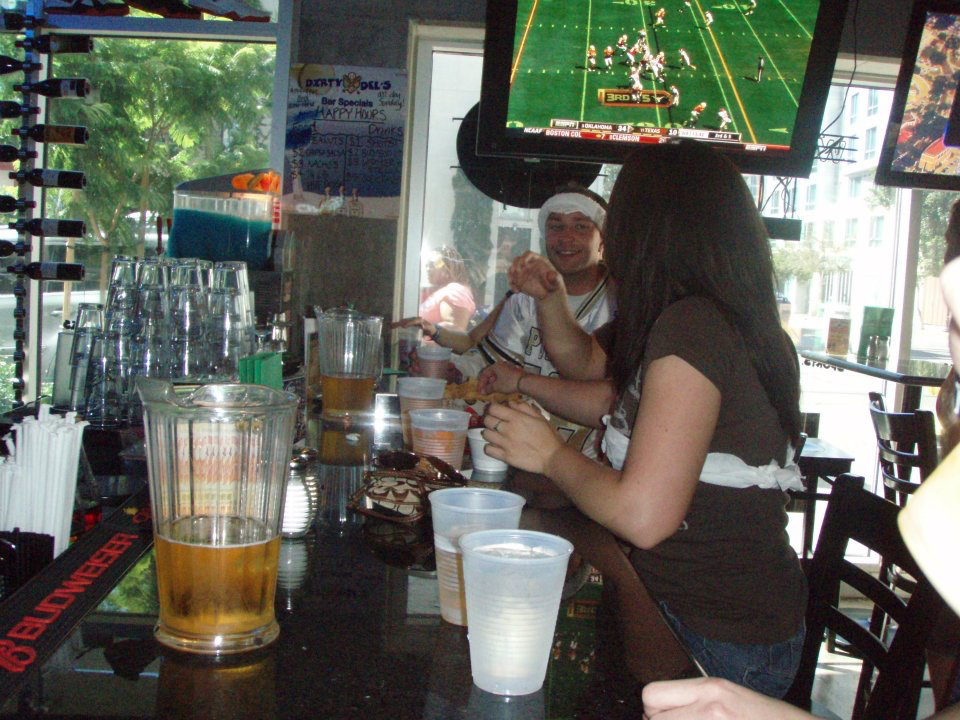I arrive at East Village Tavern and Bowl at noon and the San Diego light looks the same as it did in my memory — bright, forgiving, the kind of sun that makes everything feel possible. Except today it’s now: people are streaming in with backpacks, sunglasses, and the kind of easy confidence that says this afternoon is booked for revelry. The registration table is set up by the door, volunteers handing out wristbands and printed route maps, but most of us need no map. We came for the ritual: check in, meet old friends, recruit new ones, and wander the blocks of East Village until the city folds us into the night.
I see the familiar mix right away. Duke alumni anchoring the group, a clutch of Purdue Crew members with the same taut, rower-posture energy, a scattered but solid Clemson contingent wearing orange with a resigned kind of pride, and a few folks in Notre Dame gear who smile like they’ve been to enough reunions to know how this plays out. Everyone is approachable because we have that signifier in common: school badges, jerseys, shirts, something to say “I’m one of you” without having to say anything at all.
We start at the tavern because that’s the easiest thing to do at noon: food, coffee, bathrooms, a place to leave a coat. The bowling lanes are mostly empty at first but the televisions hum with college sports chatter that’s more comforting than informative. I hug a classmate I haven’t seen in years and immediately we fall into the old cadence — half-joking, half-real — about professors, the one absurd campus tradition, and the way our younger selves thought adulthood would be different. Noon as a start time is a bright decision. It gives us a full day to move, to talk, and to avoid the scrambling urgency of a party that has to peak before midnight.
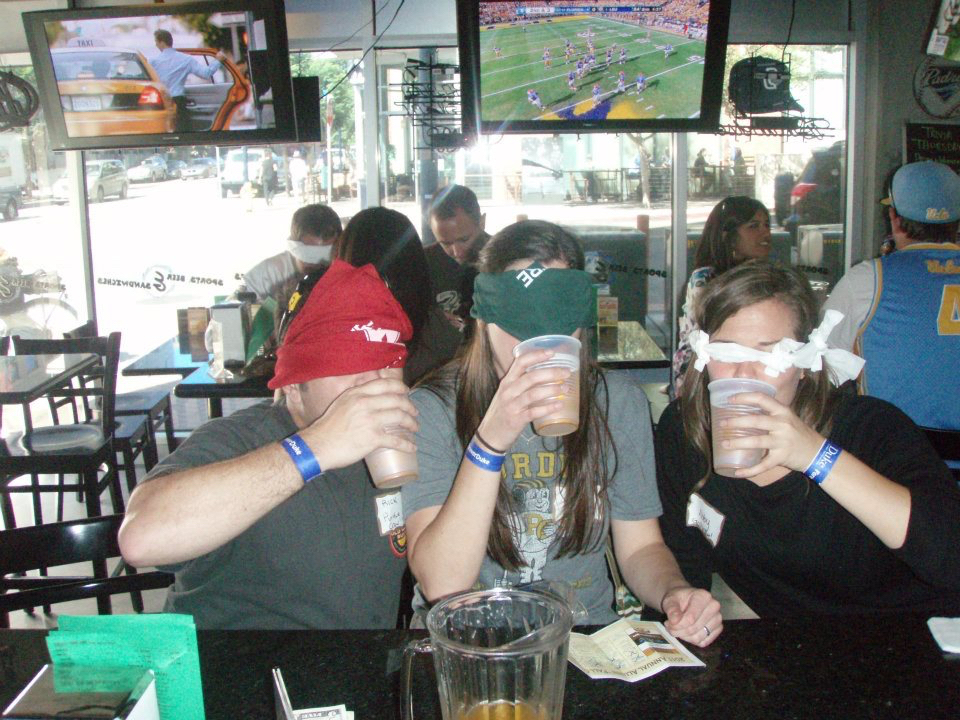
The Purdue Crew obliges a photo outside the tavern and their voices immediately swell into a chant that feels like a drumline. Passersby slow their stride, some amused and some mildly confused, but more people clap along than not. Chanting has a peculiar power: it compresses people into a single, breathing unit. For a moment the block feels like a stadium and we are all part of something practiced and spontaneous at once.
We thread through East Village rather than march in order. The neighborhood is perfect for this — every block has its own identity and you can hop from one mood to the next in five minutes. At one bar there’s an acoustic guitarist singing something that sounds suspiciously like a college-era favorite; at another, the bartender slips a pitcher across the counter and winks like he understands the assignment. The route map matters less than the in-between moments: the side-street conversations, the spontaneous dares, the passing of a pennant like a talisman between strangers.

By mid-afternoon the group has found a rhythm: twenty minutes here, an hour there, always leaving room for those who lag behind to finish a conversation or to make a quick call. There’s chatter about careers and kids and the little domestic victories that don’t belong on résumés — the first vegetable you managed to grow, the time you fixed a leak yourself, the bookshelf that finally looks like a bookshelf. These are the adult adjustments under the college veneer; they are small and earnest, and they keep the day from becoming caricature. Beneath jerseys and chants are lives that have changed and things we want to celebrate quietly.
The Purdue Crew keeps the pace honest with a cadence ritual: hit the cadence at every stop and then order food. People adopt it for reasons that aren’t purely social — it’s like a heartbeat that keeps the group moving and makes the day feel intentional. The cadence becomes a dare and a comfort; it turns a pub crawl into a kind of traveling ceremony. Someone names unofficial rules and everyone obeys because the rules keep us laughing at ourselves rather than at each other.

Friendly rivalry surfaces in the playful teasing that alumni are good at. Clemson jabs Duke about a long-ago game as if it were yesterday; Notre Dame folks have a dry wit and a catalog of coach names that makes them the scoreboard historians for the day. It’s all affectionate — each insult punctuated with a laugh and a handshake. We compare embarrassing college stories in low-stakes confessions; people offer up the kind of anecdotes that belong to decades of shared lore: the freshman who overslept orientation, the prank that went too far, the nights that felt infinite then and nostalgic now.
Food becomes the social glue just after three. A bar with a wood-fired oven calls us in and pizza does the thing food always does: it makes us generous. We share slices unevenly, negotiate toppings like small peace treaties, and the conversation over tomato and cheese is equal parts confessional and ridiculous. Someone nominates a “best tailgate snack” and out of nowhere a heated, playful debate breaks out about whether pineapple on pizza is a crime or a culinary revelation. The argument dissolves into laughter and another pitcher of beer.
Dusk brings mischief. The daylight confidence gives way to something more theatrical. A handful of us dream up a mock parade down a side street — someone borrows a traffic cone, another improvises a conductor’s baton, and suddenly we’re a procession of alumni waving at the city like it’s our campus. Strangers cheer, photographers lift their phones, and for ten blessed minutes downtown San Diego is ours: no job emails, no schedules, just the absurd procession of grown-ups insisting on pleasure.
At one spot the organizers — Duke alumni who steered this whole thing — call for a quick huddle and hand out those silly enamel pins that became real. They crack a few jokes, offer thanks to volunteers and the visiting schools, and the pins go around like a relic passed at a family gathering. The pins are kitsch; they are also proof. They are small objects that say: we were here. We agreed to be ridiculous together and these are the spoils of the pact.
There are quieter things as well. A Notre Dame man with a historian’s memory of obscure team statistics charms anyone who will listen. A Clemson alum shares a tailgate recipe that is now the subject of several recipe requests. A woman sits with her son, both wearing Notre Dame shirts, translating jokes and stories like a gentle interpreter. An older man confesses he came to remember a friend who died in college; the moment is soft, sincere, and the group gives space for it in a way that feels like what being part of a community should be.
As night deepens our voices harmonize — unexpected, effortless. Someone starts an alma mater and more people know the words than anyone expected. Singing together in a dim bar is the kind of vulnerability that feels both dangerous and healing; it reconnects us to something older than our jobs and houses. For a few minutes the present collapses into the past and then opens up again, letting us carry both experiences at once.
People begin to splinter into smaller groups as the late hour and the lingering drink do their work. Some head home, others aim for the taco truck, and a few of us push toward a late-night oyster bar because someone has an idea that sounds elegant at the time. We exchange numbers with the casual earnestness of people who want to keep this alive. Plans are made in the way plans at events are made — loudly, optimistically, and with a healthy disregard for logistics. Somebody jokes about organizing a bus for the next reunion; another person already volunteers to be in charge of playlists.
There are absurdities — an arm-wrestle staged like a championship that nearly topples a table, a man who vanishes to reformulate his stance on spicy salsa, and a joke that becomes a running scandal for the evening. These incidents are stitches that bind the evening’s tapestry into something you’ll recount later with exaggerated inflection and an eye-roll of affection. The wealth of small absurdities is what people mean when they say they miss “the old days”; it’s not the literal past, but the permission to act foolish without consequence.
Toward the end, we gravitate back toward East Village Tavern and Bowl like a family returning to the kitchen after a long party. It has the gravitational pull of the place where everyone met; it is where we left our metaphorical keys and where the evening’s last photograph is taken under a neon sign. The picture is crowded, imperfect, and glorious — a record of professors, spouses, kids, and strangers who were friends for a day. Someone jokes that the bar should frame it; someone else says they will. Whether it ends up on a wall or not, the image already exists in our memories and in the group chat that will flood with photos and gifs for the next 48 hours.
Driving home I think about what made today feel different from a random night out. It was the ritualized way we made space for each other: wristbands, cadences, pins, and a route map. Those small structures allowed serendipity to thrive. The presence of multiple schools — Duke, Purdue, Clemson, Notre Dame — gave the afternoon a curious generosity. These affiliations, which in other contexts can solidify into division, here became the language of connection. We used them to greet strangers, to laugh at old wounds, and to make new stories.
I tuck the enamel pin into my pocket like a talisman. It’s shiny and a little tacky and exactly what it needs to be. The pin, the picture, the handful of texts already waiting on my phone — they are small anchors that promise more than they can deliver. They promise a next time. They are reasons for people to show up.
When I talk about this afternoon later, the details will blur into a comforting collage: the noon light, the Purdue cadence, the wood-fired pizza, the mock parade, and the late-night harmonies. But certain moments will always return more crisply: the man who remembered his lost friend, the mother and son swapping jokes, the spontaneous chorus of alma maters in a bar that smelled of beer and fries. Those moments felt true in a way that I hadn’t expected; they cut through the performative noise and landed as something tender.
If you’re in San Diego and an alumni event like this is on the calendar, start at noon and come with your school shirt. Bring curiosity, appetite, and an openness to be foolish. If you bump into someone wearing Purdue Crew gear, join their cadence for a bar or two. You won’t row a boat, but you’ll move to a rhythm anyway, and for a day it will be enough. Today’s crawl proves that these rituals still work: they stitch people together, give strangers reasons to hug, and let a city block feel like a campus again.
